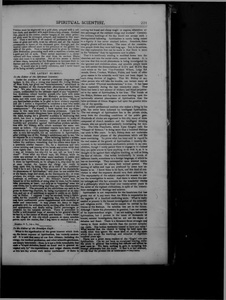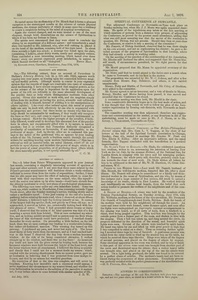< A Letter from D. D. Home (continued from page 1-165) >
edge, as has been done in the present instance, places himself in no enviable position. I will give to the poor of any city of the Union you may designate the sum of one thousand doldars for every charge against my moral character which can be proven by Mr. Anthony Trollope or anyone of the family. I have never known but one Mr. Rymer, and as it is just possible this “sotto voce Comte” has been giving notes from his diary, and making use of another name, which has been given me by a person in America, and with whom, (had I been able to make the charges clear) I would have had a law-suit for libel and slander; but he has denied being the author of the charges referred to by the American correspondent. I regret to say that the said correspondent sought to frighten me by the threatened publication of these fabrications, and if you will kindly grant me space I will take the wind out of his sails and give them to the public for what they are worth. I now quote from his letter. “I will tell (quite a refreshing memory this, of one’s school boy days) of the £50 fur coat, for which Mr. Rymer had to pay for you. I will recall the story, (here the school boy language is very polite; naughty boys usually say lie instead of story.) of Mr. Chinnery’s Parisian friend. I will cite the tailor’s bill Hiram Powers had to pay for you.”—No. 1: Mr. Rymer never gave me either a fur coat or £50; the shoe is on the wrong foot. The time alluded to was 1855, and I have a letter from Mrs. Rymer acknowledging the receipt of £50 which I sent her, when a chain of unfortunate and most painful circumstances necessitated the departure of Mr. Rymer for Australia.
My Dear Dan: — I cannot in words express my thanks for your affectionate liberality, which enables me to join my beloved husband. Believe, with affectionate greetings and many pravers how truly I am, dear Dan, always, in this or a far off country, your sincere and grateful friend,
If this “Comte” has kept notes, he will find that in 1855, a Mr. Kerritch, of Florence, made me a present of a fur coat worth £12; and as he may not have been able to play the sneak, or have his valuable information sotto voce, I can inform him that being in Pisa in 1858, on a visit to some friends, aid hearing that Mr. Kerritch had met with a reverse of fortune, I sent him the full value of the said fur coat. No. 2. I have a letter from Mr. Phinney, dated May 9th, 1876, saying: —
‘‘If anybody has used my name in the way you mention, I can only say that it is without foundation.”
No. 3. The tailor’s bill supposed (falsely) to have been paid by the late Hiram Powers, a friend of ours, the Countess Pornigia, residing No. 8 Via Jacopo da Diaceste, Florence, called, at our request, on the family of the Powers, and was told (as is the truth) that “such a thing had never taken place to their knowledge.” I fear I may as I grow old get proud; a public life extending over twenty-five years, living, as I mostly have, in the homes of my intimate friends, whose names and positions are too well and honorably known to allow even a shadow of doubt to attach itself to them, vet being surrounded by enemies, incited, in comparatively few instances, by a personal dislike to me; but by far the greater number prompted by a wish to injure the cause whose truth and dignity I have ever sought to maintain. I say, to think that after all this, such despicable and trumpery charges only to be brought against me, I have every reason to be proud. In case there should be any other “Comtes” who wish to bring themselves into public notice by attacking me. I beg to inform them, one and all, that I have no dread of “sotto voce” insinuations. As I said in my reply to Mme. Lemarie, the letter published in the Sunday Herald was not intended for publication. I had no right to touch the private life of anyone, and had I been in possession of a letter written me in March, wherein the author of a book explains that certain most monstrous assertions were “assumptions” and “slan ders” of his, much that has been to me, as well as to others, unpleasant, would have been avoided. This is the first and it will be the last time I have ever taken the trouble to reply to “sotto voce” absurdities. When distinct proofs are given of what is asserted, I have my refuge in a Court of Justice, and I will use it.
Your most obedient.
La Malou, Herault, France, May 10, 1876.
The Latest Humbug
To the Editor of the Spiritual Scientist:
Under the auspices of several prominent clergymen and laymen in this city, a young man named Mr. Irving Bishop, of New York, has given two “entertainments,” advertised as “the exposure of the characteristic phenomena of Spiritualism.” We who believe that there are phenomena, are, of course, undisturbed by the ultimate result of any ‘'exposure,” but, doubtless, others besides myself, who have with some warmth commented upon Mr. Bishop’s performance, have been met with some such general remark as this: “Many of you Spiritualists profess to be glad to have trickery exposed, and yet I notice a disposition to condemn a man who seeks to expose the doings of mediums, as if you were afraid of the consequences. " For myself, I have replied that my objections to this man were in his cunning pretenses. Upon his assumptions certain clergymen have eagerly grasped him by the hand, hoping for a powerful auxiliary in destroying that which has been a bugbear and embarrassment to many of them for a quarter of a century. Some of them with inborn hostility and prejudice against Spiritualism profess satisfaction with Mr. Bishop, while others maintain the same reticence as before. The published reports have been very unsatisfactory to a really inquiring reader. A friend of mine who is very fair-minded, but an unbeliever in Spiritualism, after visiting one of Mr. Bishop's exhibitions said to me, “As an exposer he is a humbug. After imitating, behind a screen, several of the tricks of the mediums, he only did one of them before the audience, remarking that the others were done in a precisely similar manner; viz., by a dexterous and very clever twisting and turning of his hands and wrists while they were tightly tied. This was not at all satisfactory. I think it was all trickery, but why did he not tell us how it was done?” From what my friend says, Mr. Bishop, while he omits any attempt to do what many mediums in public and private have done, really does some remarkable things. If it is done by legerdemain, as he alleges it is, why does he not at once accept the honors the clergy are ready to heap upon him, by doing them all in view of the audience? And it he is not a liar as to “the exposure of the characteristic phenomena of Spiritualism,” why does he not exhibit five or six hands, large and small, as the Davenports do; or even produce the simple raps with accompanying intelligence, as hundreds of mediums do? Mr. Bishop’s claims may be honest as td his methods of doing what he does, but he makes false pretenses, at least; not only as to “exposing” even his own tricks, but in advertising that they are “the characteristic phenomena.” The proceeds sf his exhibitions are said to be given to deserving charities, he being represented as an amateur, and not at all ambitious to appear in public as an Anderson or Heller. I suppose I may be excused, being a Spiritualist, for the credulity of suggesting that, like the Fays, he may have mediumistic power supplemented with elasticity of limbs and conscience. It may please hit fancy to begin gradually with the orthodox world, exciting alike their wonder and approbation, and finally taking liberal percentages or presents for his valuable services. There is precedent to excite a well-founded hope of success in his general idea (if he has it) in the career of Moody and Sankey. I find a latter in the Eagle of this city which presents so many sensible points upon the matter, that I beg leave to enclose it to you.
Brooklyn, N. Y., July 2, 1876
Spectres of Animals
Sir,—A letter from Prince Wittgenstein appeared in your journal last month, containing a singularly interesting account of spectres of dogs and other animals, and I am sure that those cases related by the Prince’s personal acquaintances will doubtless obtain a ready credence, sufficient to rescue them from the realm of superstition; further, I trust that his able paper may have the effect of inducing others to come forward with their experiences on the same subject, who, like myself—until the matter was taken up by abler hands—would have shrunk from the obloquy incidental to every new phase of psychological phenomena.
The following case came under my own immediate notice. Some ten years ago, while resident in Manchester, I was returning towards Upper Brook-street, after the Sunday morning’s service, walking slowly and in rather a meditative mood. I was just coming to the end of a meadow pathway, before entering the main road, when I observed, at about fifteen yards’ distance, a hideously ugly dog looking intently at me. It seemed of the largest bull-dog species, dark, and grizzly as if from old age; as I approached, it moved on before me, occasionally looking back with furtive glances of terror. When I had proceeded about twenty or thirty yards, I observed that the action of its hind quarters was that of a dog receiving a severe kick from behind. This at once enchained my attention, and on looking quickly around I saw no person near me from whom the cause of this movement could have proceeded. I watched closely thereafter its every motion. On proceeding a little farther, on the left hand, there was an open carriage-way leading to a comfortable-looking, but rather old-fashioned, mansion. This seeming dog turned up this gateway. I quickened my pace, and never lost sight of it. The house stood thirty or forty yards from the entrance, and as I had reached halfway to the house I observed the dog leap down a sunken basement window. At the risk of its being considered obtrusive, I walked straight up to the window, and there was no dog there! An incarnate dog could not have left the place except by leaping back, because the basement windows were built between the height of the front level, and the lower windows were all stanchioned. I followed the thing so quickly and closely that I could not for a moment doubt my senses; which, coupled with the seeming chastisement from an unseen power, gave me no hesitation in believing that I was protected from some malign influence, and that by an unseen but watchful guardian.
My conviction of that at the time was complete, and will never be forgotten. Knowing how incredible such a statement would appear, I never mentioned the circumstance to my nearest friend, and whether the term hallucination be awarded as the solution of the narrative it matters not, it may induce others to come forward with similar episodes of life.
3rd July, 1876.
Editor's notes
Sources
-
Spiritual Scientist, v. 4, No. 19, July 13, 1876, p. 221
-
Spiritual Scientist, v. 4, No. 202, July 7, 1876, p. 324



